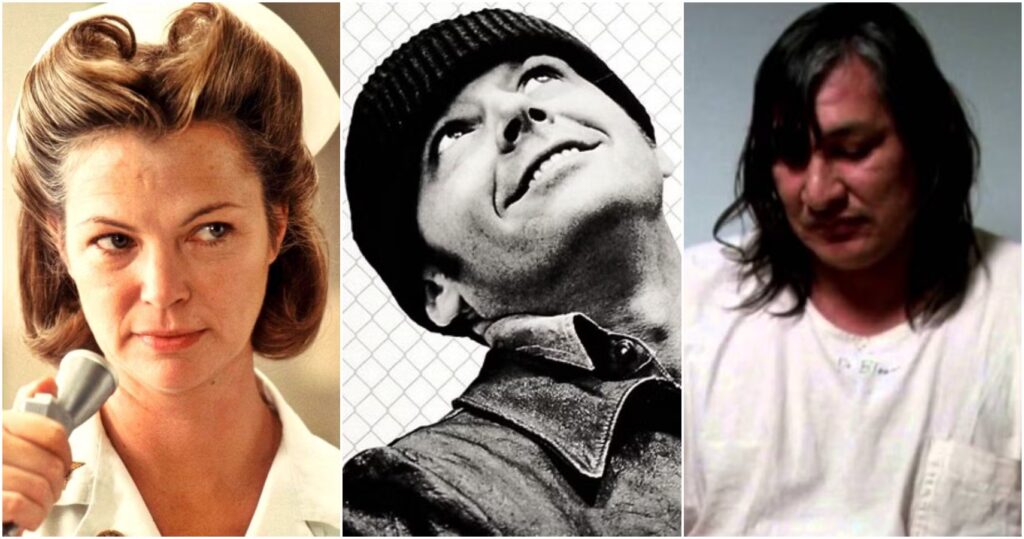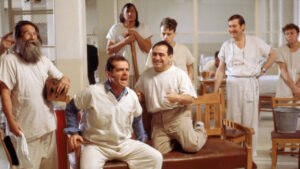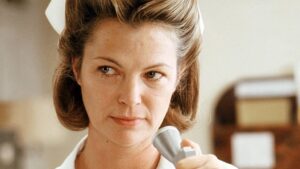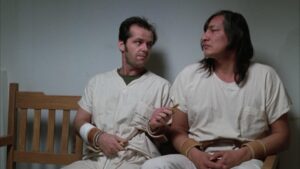
One Flew Over the Cuckoo’s Nest (1975) – A Battle for the Human Spirit
One Flew Over the Cuckoo’s Nest (1975), directed by Miloš Forman and based on Ken Kesey’s 1962 novel, is a gripping drama that explores themes of power, freedom, and institutional control. Starring Jack Nicholson as the rebellious Randle Patrick McMurphy, the film takes place in a mental institution where he challenges the rigid authority of Nurse Ratched (Louise Fletcher). Through its powerful performances and profound social commentary, the film remains one of the most influential works in cinematic history.
Plot Summary

The film begins with McMurphy, a charismatic but troublemaking convict, being transferred from a prison work farm to a psychiatric hospital. Believing he can avoid hard labor by faking mental illness, he soon realizes that life inside the institution is far more oppressive than he expected. The hospital is run by the cold and manipulative Nurse Ratched, who maintains strict control over the patients through passive-aggressive humiliation and psychological manipulation.
McMurphy quickly bonds with fellow patients, including the shy and stuttering Billy Bibbit (Brad Dourif), the paranoid Martini (Danny DeVito), and the silent but observant Chief Bromden (Will Sampson). Unlike the others, McMurphy refuses to conform and continuously challenges Ratched’s authority, whether by organizing a vote to watch the World Series, sneaking patients out for a fishing trip, or instilling a sense of independence among them.
However, Ratched sees McMurphy’s rebellious influence as a threat to her control. She subtly tightens her grip, using medication, therapy sessions, and electroshock treatment to break his spirit. But McMurphy remains defiant, pushing the patients to think for themselves and dream of a life beyond the walls of the institution.
The Tragic Climax

In a desperate act of rebellion, McMurphy sneaks two women into the ward and organizes a wild party, allowing the patients to experience freedom and joy, if only for one night. Billy, who has long suffered from low self-esteem under Ratched’s psychological torment, experiences a fleeting moment of confidence when he spends time with one of the women. However, when Ratched finds out, she ruthlessly shames him, leading Billy to take his own life.
Devastated and enraged, McMurphy attacks Ratched, attempting to strangle her. Though he nearly succeeds, the orderlies subdue him, and he is subjected to a lobotomy, leaving him in a vegetative state. This shocking fate devastates Chief Bromden, who sees McMurphy as a symbol of resistance. In a final act of defiance, Chief smothers McMurphy to put him out of his misery and escapes the hospital, fulfilling the dream McMurphy had encouraged him to pursue.
Themes and Symbolism
The film explores freedom vs. control, with McMurphy representing individuality and resistance against oppressive authority. Nurse Ratched, on the other hand, embodies institutional control, using manipulation rather than outright violence to maintain order.
Another major theme is sanity vs. insanity. The patients, though labeled as mentally ill, display deep humanity, whereas the hospital staff, who are supposedly “sane,” exhibit cruelty and indifference. McMurphy’s struggle is not just against Ratched but against a system designed to suppress individuality and free will.

Symbolism plays a significant role throughout the film. Chief Bromden, who pretends to be deaf and mute, represents the silenced and powerless. His escape at the end symbolizes hope, breaking free from oppression. The repeated imagery of confinement—barred windows, locked doors—reinforces the theme of entrapment, both physical and psychological.
Jack Nicholson’s Iconic Performance
Jack Nicholson delivers one of the greatest performances in film history as McMurphy, bringing a perfect blend of charm, defiance, and vulnerability. Louise Fletcher’s portrayal of Nurse Ratched is equally unforgettable, making her one of cinema’s most chilling antagonists. Their intense power struggle forms the heart of the film, elevating it to masterpiece status.
Watch Here: https://youtu.be/OXrcDonY-B8?si=FWK13EbwJRVWjQ6b
Legacy and Impact
One Flew Over the Cuckoo’s Nest swept the Big Five Oscars (Best Picture, Best Director, Best Actor, Best Actress, and Best Adapted Screenplay), a rare feat in cinema. Its critique of institutional control remains relevant, sparking discussions on mental health care and individual rights.
Even decades after its release, the film continues to resonate, reminding audiences of the importance of personal freedom and the dangers of unchecked authority. With its powerful performances and haunting message, One Flew Over the Cuckoo’s Nest is a cinematic masterpiece that lingers in the mind long after the credits roll.
Final Verdict: 10/10 – A Harrowing, Thought-Provoking Classic.




